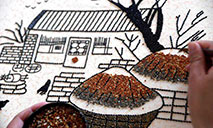Chinese ambassador urges cooperation, refutes fabricated reports on Xinjiang in CNN interview

The photo posted on the website of the Chinese Embassy in the U.S. shows Chinese Ambassador to the United States Cui Tiankai speaking in an interview with CNN on March 25, 2021.(Photo/Xinhua)
WASHINGTON, March 27 (Xinhua) -- Chinese Ambassador to the United States Cui Tiankai called for international cooperation based on equality, mutual benefit and mutual respect in an interview with CNN on Thursday, and refuted fabricated reports on Xinjiang.
"We believe what today's world wants and what tomorrow's world would want are joint efforts by all countries to build a community of nations for a shared future," Cui said in a live interview with CNN anchor Christiane Amanpour.
Any attempt to divide the world into different camps or build confrontational military blocs are not solutions to global challenges, he noted.
The high-level meeting between top Chinese and U.S. diplomats in Anchorage, Alaska last week was a timely one, and it helped both sides have a better understanding of the other, Cui said.
"I hope this will be the beginning of a long process of dialogue, communication and hopefully coordination between the two sides," he added.
"Our goal is to meet the growing aspiration of the Chinese people for a better life. Our goal is not to compete with or replace any other country," the ambassador said.
The ambassador said that China is committed to multilateral cooperation, adding that such cooperation would have to be based on equality, mutual benefit and mutual respect.
"How can people cooperate with each other if they don't treat each other as equals? ... This is the problem of Western countries," he said. "They still have to learn how to treat other countries, other races, other civilizations as equals."
China very much stands for open and fair competition, said Cui.
"But the problem is," he said, "how can we have fair competition when Chinese companies are discriminated against? When Chinese senior business CEOs are detained without any reason? When there's such a clear attempt to politicize everything? When (there is) such an attempt of nationalism and protectionism against international rules?"
"So in order to have open and fair competition, I think these past mistakes will have to be corrected first. Otherwise, there's no basis for us to engage in such a competition," he said.

The photo posted on the website of the Chinese Embassy in the U.S. shows Chinese Ambassador to the United States Cui Tiankai (R) appearing in a live interview with CNN anchor Christiane Amanpour on March 25, 2021. (Photo/Xinhua)
The ambassador suggested Western countries refer to the United Nations Charter when they blame China for failing to abide by international rules, as its first chapter "set forth a number of fundamental principles for international relations."
"The first principle set out in the UN Charter is sovereign equality of all its members. Another principle is the obligation of all the UN members to refrain from threat or use of force against the territorial integrity and political independence of any state," he said.
The ambassador said China is certainly ready to take part in international cooperation on climate change, but the "political climate also has an impact on the efforts to deal with the natural climate."
The United States and some other Western countries "still have to prove they are seriously committed" and "they are earnest about their international obligations," he said.
In response to a question about CNN's so-called investigative story at an orphanage in China's Xinjiang Uygur Autonomous Region, Cui said, "it's immoral to take advantage of any particular family situation and manipulate it. This is not true journalism. It's very unfortunate for CNN."
"I still remember you reporting the Iraq War some years ago. So, can people come out and repeat these same stories to the world? No. Because many of the stories were just based on falsehood, were just fabrication," Cui added.
"It's very unfortunate some people, including some journalists, they start with very strong bias and prejudice. That's their problem. That's how they come to very different conclusions about the particular situation, very much against real facts," said Cui.
In the past few years, more than 1,000 people, including diplomats and journalists, from over 100 countries, many of them Muslim countries, have visited Xinjiang, the Chinese ambassador said, refuting CNN's claim that Xinjiang was closed to international officials and journalists. "What they have seen are real facts."
"In terms of the population, the Uygur population has more than doubled in the last four decades," Cui said. "So how can people talk about the so-called genocide?"
Photos
Related Stories
- Everything Xinjiang has done is above board: local lawmaker
- No single case of "forced labor" found in Xinjiang: BCI Shanghai office
- Facts destroy lies, rumors about Xinjiang cotton
- Commentary: Stop tainting Xinjiang's pure cotton with dirty politics
- China's Xinjiang denounces sanctions as utterly groundless
Copyright © 2021 People's Daily Online. All Rights Reserved.










